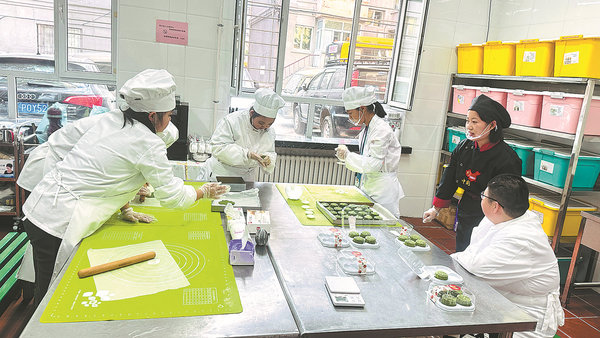Life Skills Improve Lives for Those with Disabilities
 |
| Students have a baking class at Liaoyuan School in Harbin, Heilongjiang Province on Tuesday. [Photo by Zhou Huiying/China Daily] |
A special school in Harbin, Heilongjiang Province, is providing young people with conditions such as autism, Down syndrome and intellectual disabilities with vocational education opportunities so that they can make the most of their skills in life.
At Liaoyuan School last month, Liu Fengqi, who has an intellectual disability, worked with his classmates to make mooncakes ahead of the Mid-Autumn Festival.
After rolling, adding fillings and molding, he and four other students completed their mooncakes in about 10 minutes.
The 18-year-old is receiving vocational education as a senior high school student at Liaoyuan, a special education school offering both nine-year compulsory education and vocational high school education for students with moderate to severe intellectual disabilities.
"It seems quite easy for most people to complete these tasks, but it is a great challenge for our students. It took them about four weeks to learn how to make a mooncake," said Shen Hong, who has been teaching baking at the school for four years.
"For their homework, I assigned them to make handmade mooncakes for their parents," she said in an interview last month. "I believe they can really surprise their parents for the upcoming Mid-Autumn Festival."
Liaoyuan was founded as the Qizhi School in 1984 and its name was changed to Liaoyuan in 2003.
With the goal of training children with intellectual disabilities to become "people who can survive and live", the school has spent decades promoting physical and mental rehabilitation to help children with intellectual disabilities grow healthily. During instruction, teachers integrate their knowledge of physical and speech therapy as well as psychological counseling.
The school adheres to the concept of "combining medical education and comprehensive rehabilitation" and actively guides the teachers to stay abreast of the latest achievements in modern medicine and rehabilitation technology.
The school has 32 classrooms for subjects including dance, sports and cooking to help meet the educational needs of its 256 students.
"Different from general schools, we teach students more skills to adapt to daily life," said Tian Yu, deputy Party secretary of the school. "Students learn various activities, such as washing their faces, dining, taking the bus and even making payments with a smartphone."
In a room that has been decorated to mimic a washroom, there are 10 faucets set on top of sinks.
"We tried to collect nearly all the different kinds of faucets on the market, hoping to teach the students how to use them," she said. "We also have a room that looks like a fast-food restaurant, and we teach the students how to order food and eat dinner."
Around the year 2000, the school introduced sports such as swimming, table tennis and roller skating to the students. Over the past four years, students from the school have gone on to win 13 gold, 18 silver and 16 bronze medals at national competitions.
"Swimming has little restrictions on limb coordination, which can help the students get more physical exercise," said Liu Tao, the school's swimming coach. "The sport can also help improve their social communications and self-confidence."
Yang Baolong, a 15-year-old student with autism in his ninth year of compulsory education at the school, has won 18 medals at provincial and national competitions since winning his first bronze in Beijing in 2017.
"At first, I just hoped to enhance his physical strength when I sent him to join the swim team. However, I was surprised to see that he became stronger both physically and mentally, and he began to achieve more success in the sport," said Yang's mother Jiang Qibin.
"His change also took away my negative feelings caused by his illness," she said. "After graduation from junior high, I hope he can continue to study at the school to gain even more abilities, which can help him better adapt to society."
Principal Wang Guohua said parents are often moved by the progress that their children make at the school.
"At the end of every semester, we hold a parents' meeting to present the students' study achievements," she said. "We often find that the parents can't help shedding tears when they see the pictures drawn by their children or taste food that the students cooked.
"We believe that this is recognition of our work, and we feel quite honored to be teachers at the school. We will continue to try our best to provide the best resources, the best education and best services to our students."
(Source: China Daily)
Please understand that womenofchina.cn,a non-profit, information-communication website, cannot reach every writer before using articles and images. For copyright issues, please contact us by emailing: website@womenofchina.cn. The articles published and opinions expressed on this website represent the opinions of writers and are not necessarily shared by womenofchina.cn.






.jpg)

 WeChat
WeChat Weibo
Weibo 京公网安备 11010102004314号
京公网安备 11010102004314号